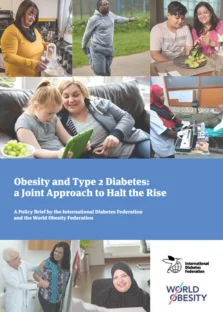Type 1 diabetes cannot be prevented, but research is ongoing to determine its environmental triggers. While type 1 diabetes cannot be prevented, there are several steps people can take to reduce the risk of developing type 2 diabetes.
Unhealthy eating habits and sedentary lifestyles associated with urbanisation are common factors contributing to the development of type 2 diabetes. There is overwhelming evidence from studies in the USA, Finland, China, India and Japan that lifestyle changes (achieving a healthy body weight and moderate physical activity) can help prevent the development of type 2 diabetes in those at high risk.
IDF recommends physical activity at least between three to five days a week, for a minimum of 30-45 minutes.
Preventing type 2 diabetes involves a healthy lifestyle: a balanced diet, regular exercise, and avoiding sugary and processed foods. Maintaining a healthy weight is crucial as obesity increases the risk. Even a small weight loss can significantly reduce the risk of type 2 diabetes. Lastly, regular screenings and check-ups, especially for people at risk, can detect early signs and delay or prevent the onset of diabetes.

IDF recommendations for a healthier diet:
- Choose water, coffee or tea instead of fruit juice, soda, or other sugar-sweetened beverages
- Eat at least three servings of vegetables every day, including green leafy vegetables
- Eat up to three servings of fresh fruit every day
- Choose nuts, a piece of fresh fruit, or unsweetened yoghurt for a snack
- Limit alcohol intake to a maximum of two standard drinks per day
- Choose lean cuts of white meat, poultry or seafood instead of red or processed meat
- Choose peanut butter instead of chocolate spread or jam.
- Choose whole-grain bread, rice, or pasta instead of white bread, rice, or pasta.
- Choose unsaturated fats (olive oil, canola oil, corn oil, or sunflower oil) instead of saturated fats (butter, ghee, animal fat, coconut oil or palm oil.
IDF diabetes prevention resources

Obesity and Type 2 Diabetes: a Joint Approach to Halt the Rise

Cost-effective solutions for the prevention of type 2 diabetes




